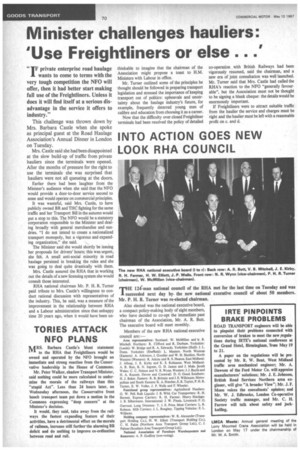Minister challenges hauliers: 'Use Freightliners or else
Page 72

If you've noticed an error in this article please click here to report it so we can fix it.
Fprivate enterprise road haulage wants to come to terms with the very tough competition the NFO will offer, then it had better start making full use of the Freightliners. Unless it does it will find itself at a serious disadvantage in the service it offers to industry."
This challenge was thrown down by Mrs. Barbara Castle when she spoke as principal guest at the Road Haulage Association's Annual Dinner in London on Tuesday.
Mrs. Castle said she had been disappointed at the slow build-up of traffic from private hauliers since the terminals were opened. After the months of pressure for the right to use the terminals she was surprised that hauliers were not all queueing at the doors.
Earlier there had been laughter from the Minister's audience when she said that the NFO would provide a door-to-door service second to none and would operate on commercial principles.
It was wasteful, said Mrs. Castle, to have publicly owned BR and THC fighting for the same traffic and her Transport Bill in the autumn would put a stop to this. The NFO would be a statutory corporation responsible to the Minister and dealing broadly with general merchandise and sundries. "1 do not intend to create a nationalized transport monopoly, but a vigorous and expanding organization," she said.
The Minister said she would shortly be issuing her proposals for drivers' hours; this was urgent, she felt. A small anti-social minority in road haulage persisted in breaking the rules and she was going to deal quite drastically with them.
Mrs. Castle assured the RHA that in working out the details of a new licensing system she would consult those interested.
RHA national chairman Mr. P. H. R. Turner paid tribute to Mrs. Castle's willingness to conduct rational discussion with representatives of the industry. This, he said, was a measure of the improvement in the relationship between RHA and a Labour administration since that unhappy time 20 years ago, when it would have been un thinkable to imagine that the chairman of the Association might propose a toast to H.M. Ministers with Labour in office.
Mr. Turner outlined some of the principles he thought should be followed in preparing transport legislation and stressed the importance of keeping transport out of politics: upheavals and uncertainty about the haulage industry's future, for example, frequently deterred young men of calibre and education from choosing it as a career.
Now that the difficulty over closed Freightliner terminals had been resolved the policy of detailed co-operation with British Railways had been vigorously resumed, said the chairman, and a new era of joint consultation was well launched. Mr. Turner said that Mrs. Castle had called the RHA's reaction to the NFO "generally favour able", but the Association must not be thought to be signing a blank cheque: the details would be enormously important.
If Freightliners were to attract suitable traffic from the haulier the service and charges must be right and the haulier must be left with a reasonable profit on c. and d.
















































































































































































































































